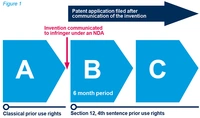Disclosing an invention before filing a patent application: why a non-disclosure agreement in Germany is not enough
For start-ups, there is often a need to communicate an invention to potential business partners before a corresponding patent application is filed. Most applicants are aware that only new subject matter is patentable and therefore will require the execution of a non-disclosure agreement (NDA) before the invention is communicated. However, due to German legal provisions regarding prior use, an NDA does not automatically overcome all problems connected with the communication of the invention before the filing of a patent application.
The concept of prior use rights as an infringement defence can be regarded as reflecting the general principle that an infringer using an invention before the applicant has filed a patent application for this invention should not be punished, because the infringer has made the invention earlier than the applicant.
Obviously, this principle should not apply if a patent infringer obtained their knowledge of the invention from the inventor themselves, and this situation is dealt with differently by different regulations in different jurisdictions. For example, the 35 U.S. Code § 273 (e)(2) denies the assertion of a right of prior use derived from the patentee, or from persons in privity with the patentee. In contrast, Section 12 of the German Patent Act allows the assertion of such a right of prior use under certain conditions.
Referring to the above example, consider a situation in which the start-up obtained a patent for the communicated invention and a former potential business partner, to whom the start-up has communicated the invention under an NDA before filing a corresponding patent application, infringes the patent.

We will now discuss the question of whether such an infringer can apply a defence based on a prior use right in Germany in this case for some typical circumstances, with reference to figure 1 shown above.
For the sake of simplicity, it is assumed that the start-up files a German patent application and that no priority has been claimed.
In the event that the infringer has put the now patented invention into practice (time period A) before the communication of the invention, and before the start-up has filed the patent application, a defence based on a prior use right is applicable in Germany.
In the event that the infringer has put the now patented invention into practice after the invention has been communicated, and did so as a result of the communication of the invention (time periods B and C), whether a defence based on a prior use right is applicable in Germany or not depends on the actions of the start-up.
In order to avoid a prior use right for the infringer from arising, it is necessary that the start-up had reserved its rights in the event of the patent being granted. Ideally, this is declared immediately before the invention is communicated to the infringer.
The importance of this declaration cannot be overestimated. In the absence of a reservation of such rights in the event of the patent being granted, it is often assumed in case law that a right of prior use has arisen through acts of use (BGH 07.01.1965, Ia ZR 151/63, “Lacktränkeinrichtung”), making a defence based on a prior use right applicable in Germany.
For the following situations, it is assumed that the start-up has declared the reservation of its rights in the event of the patent being granted immediately before the invention was communicated.
A first important situation is when the start-up files the patent application within a six-month period after the communication of the invention (time period B), and the infringer puts the invention into practice as a result of the communication of the invention in the time period between the communication of the invention and the filing of the patent application. In this first situation, Section 12(1), 4th sentence of the German Patent Act precludes a defence based on a prior use right in Germany.
A second important situation is when the start-up files the patent application later than six months after the communication of the invention (time period C) and the infringer puts the now patented invention into practice as a result of the communication of the invention within time period C and before the filing of the patent application.
To avoid a prior use right of the infringer from arising in the second situation the detail of communication of the start-up with the infringer is critical. The start-up needs to ensure that the infringer could not have considered themselves authorised to use the teaching of the invention for their own purposes, and thus ensure that the infringer did not acquire the invention in good faith. Ideally, in order to do so, the start-up has explicitly declared before communicating the invention under an NDA that they do not agree to the use of the invention.
In practice, the details of each individual case will have to be considered, and there will be circumstances beyond the highly simplified situations we have discussed which will allow a successful defence based on a prior use right derived from the applicant in Germany.
As a further point, it is worth noting that the German legal provisions regarding prior use will be effective even when applied to unitary patent infringement proceedings before the Unified Patent Court, since Art. 28 UPCA refers to the national definition of, and approach to, prior use rights.
In short
An awareness that the German Patent Act provides for the existence of a right of prior use derived from the applicant or their legal predecessor is vital, especially for start-ups.
Nevertheless, if the case law and the legal provisions of the German Patent Act are carefully considered when the invention is communicated to a potential business partner, and before a patent application is filed, it can be avoided that the business partner obtains a right of prior use.

